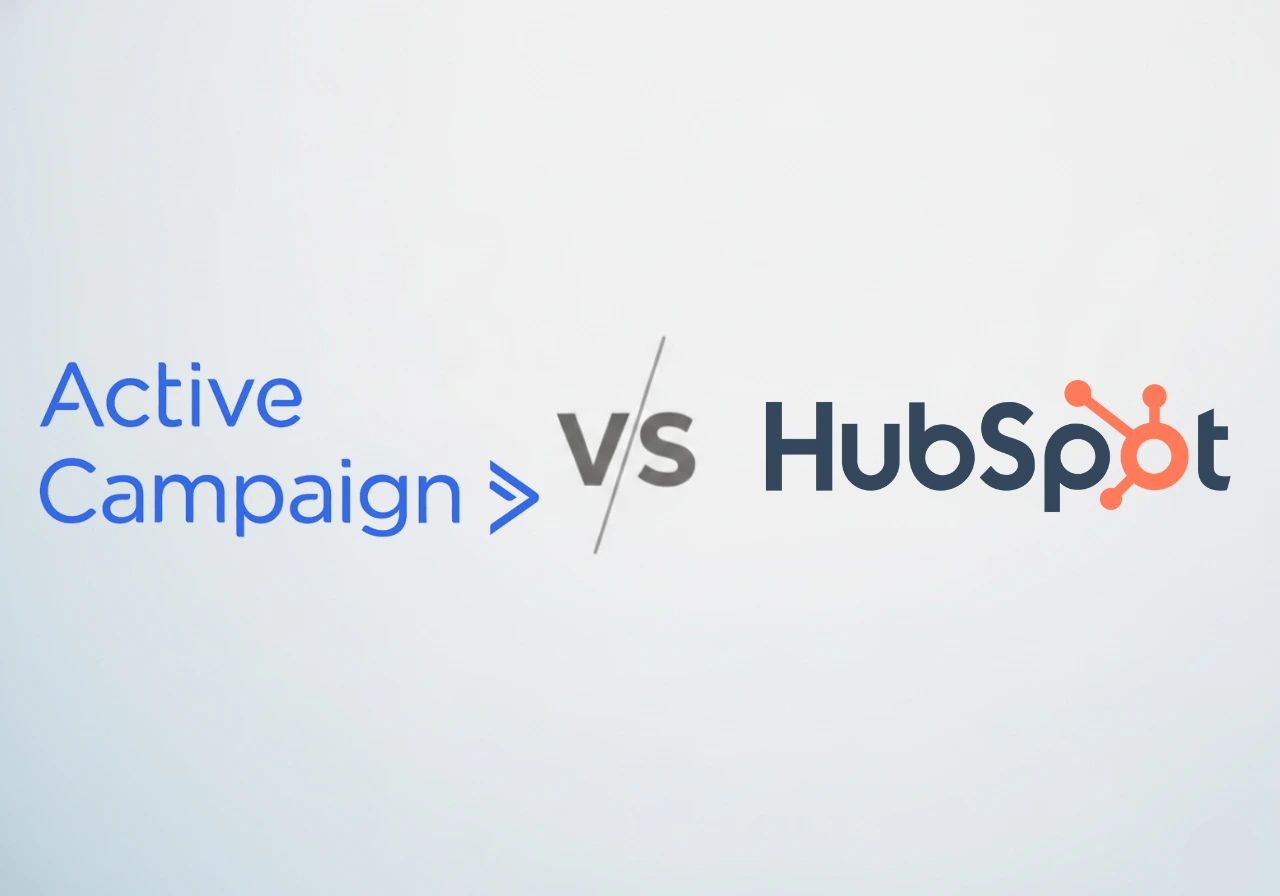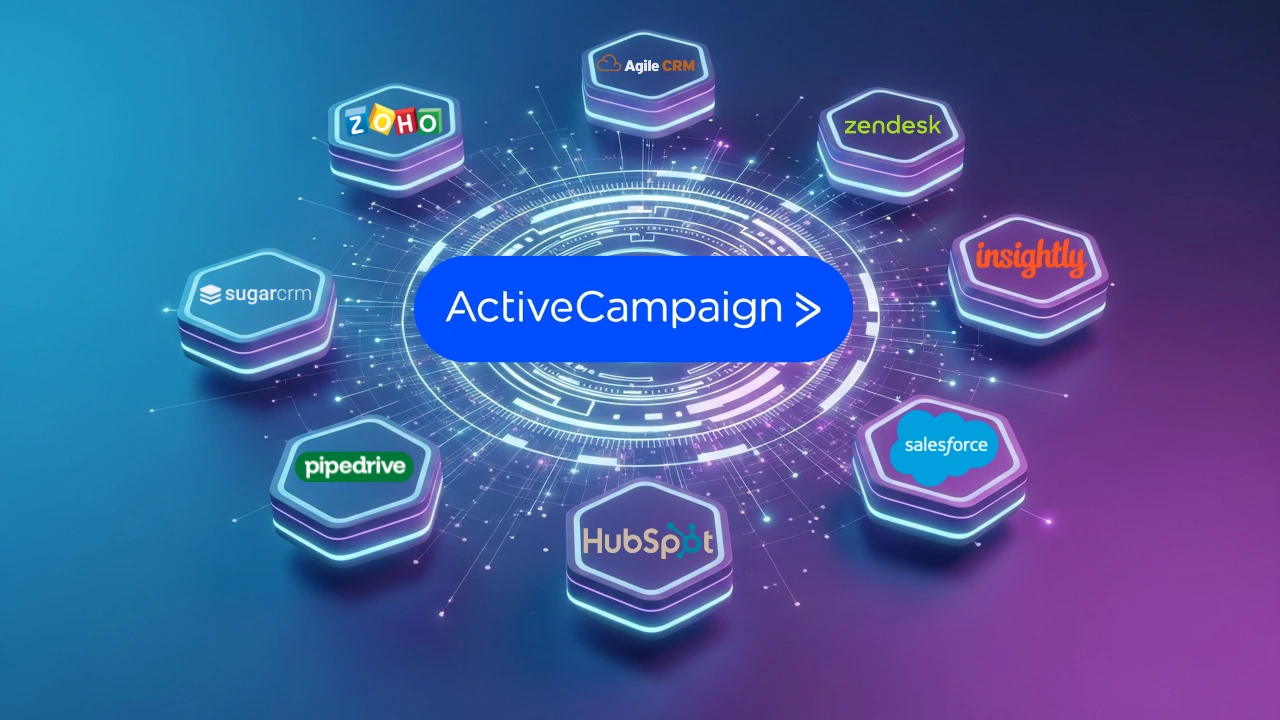•
Zoho CRM vs HubSpot: The Complete CRM Comparison for Growing Businesses
November 13, 2025
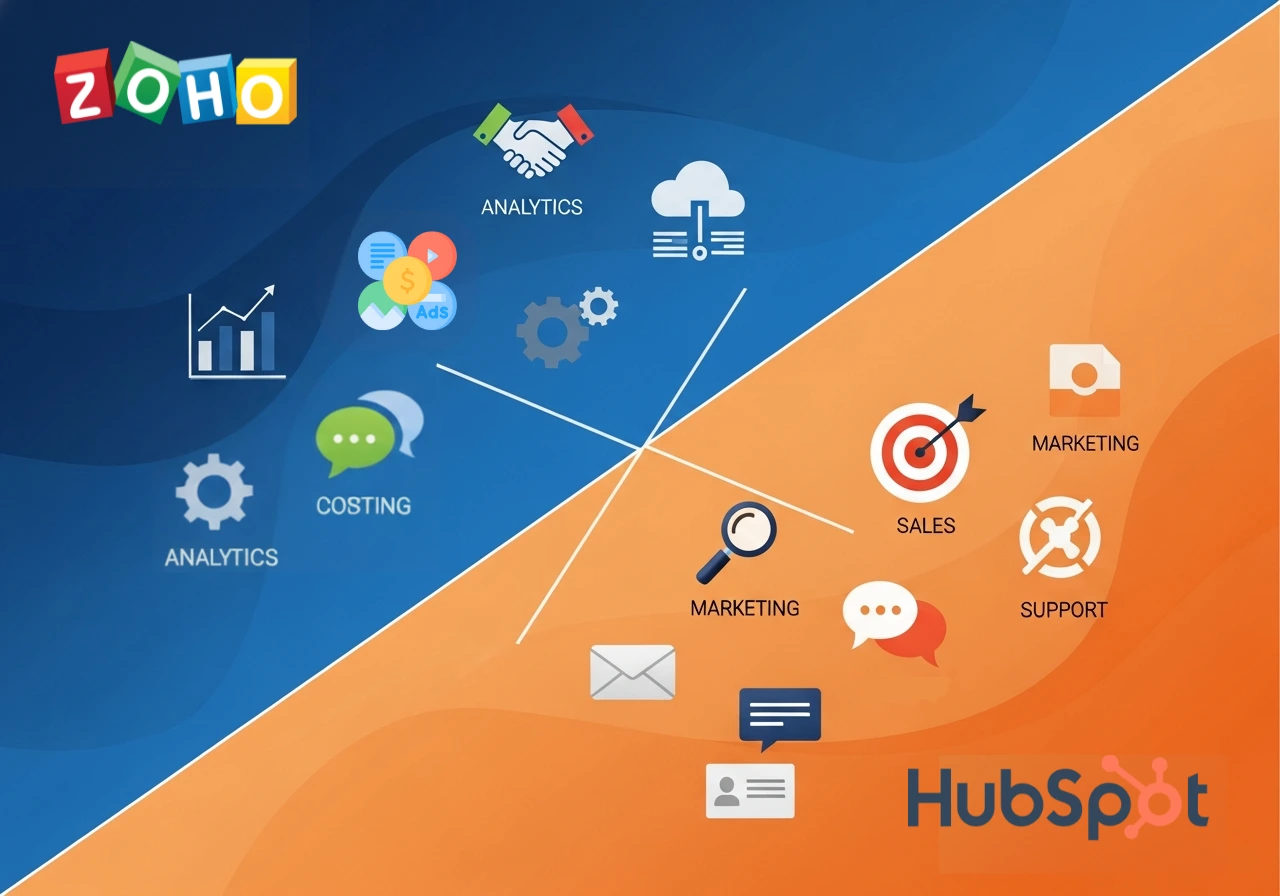
Quick Comparison Summary
HubSpot wins for growing businesses that need integrated marketing automation, comprehensive email marketing, and all-in-one capabilities at scale. Zoho CRM wins for sales teams prioritizing extensive customization options, cost-effective scaling, and robust workflow automations without marketing complexity.
Still unsure which platform fits your specific needs? Read our detailed comparison below or contact Capital S Consulting for expert CRM selection guidance.
- Who each platform fits: Zoho CRM serves cost-conscious teams needing deep customization and advanced workflow builder capabilities; HubSpot serves businesses requiring integrated sales and marketing operations with intuitive user adoption
- Time-to-value insights: Zoho CRM typically achieves basic user adoption within days but requires weeks for advanced customization; HubSpot's comprehensive features provide immediate value but need proper training for full implementation
- TCO considerations: Zoho CRM's transparent pricing can scale affordably with extensive features; HubSpot's enterprise features require significant investment in higher-tier plans but include built-in support
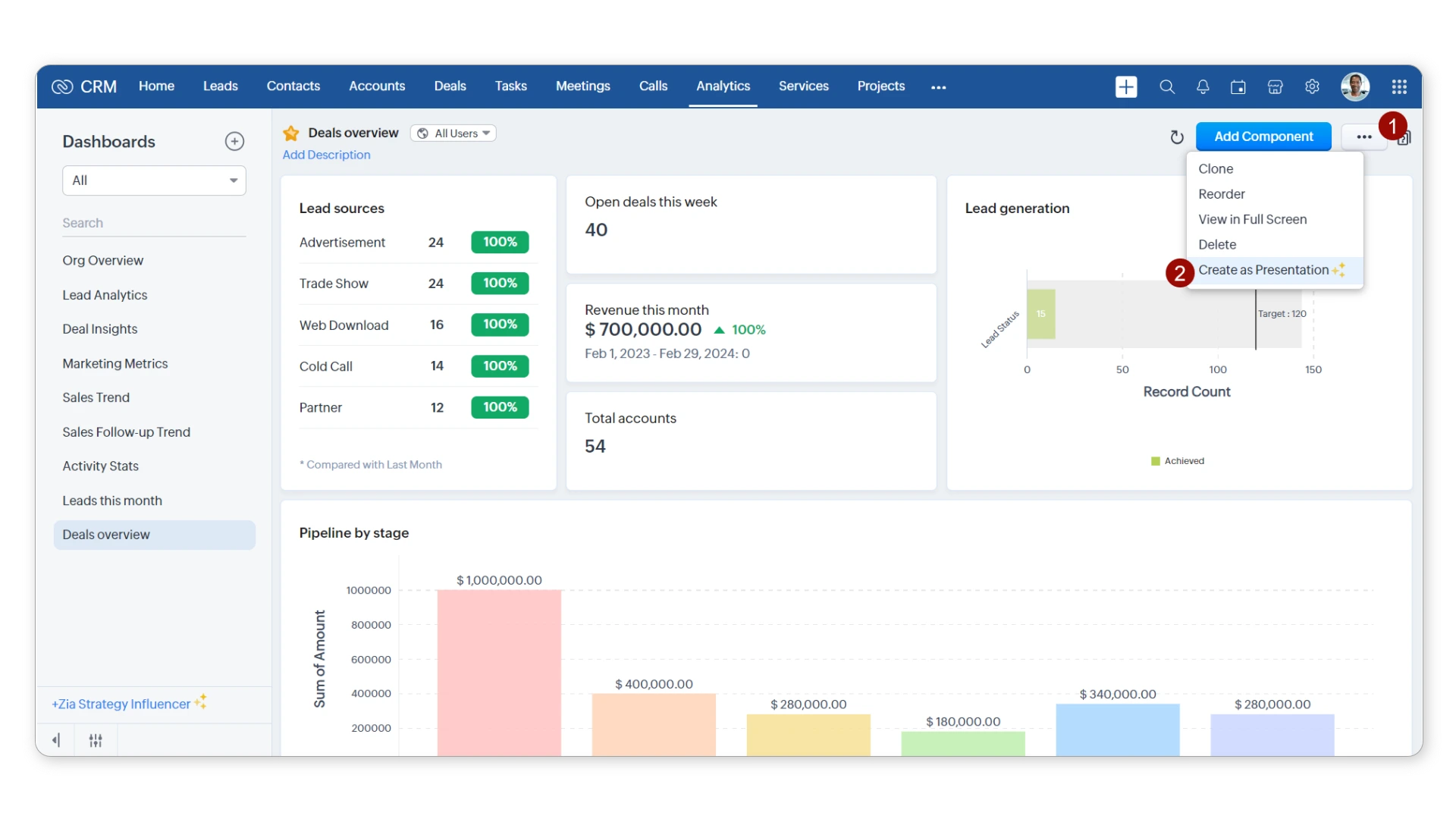
Zoho CRM positions itself as a comprehensive CRM platform that prioritizes customization and automation capabilities while maintaining competitive pricing for growing businesses. The platform emphasizes multichannel communication and flexible sales automation, making it particularly effective for organizations needing tailored sales processes and extensive contact management capabilities.
Key Features
Blueprint Workflow Management: Zoho's Blueprint feature provides visual process management that standardizes complex sales activities across teams, ensuring consistent customer interactions and proper deal progression through customizable stages.
Advanced Contact Management: The platform offers sophisticated contact segmentation with custom objects, enabling businesses to organize customer relationships based on unique business requirements while maintaining comprehensive customer journey tracking.
AI-Powered Sales Assistant: Zia, Zoho's AI features include predictive lead scoring, sales forecasts, and email automation that help sales teams prioritize high-value opportunities and streamline repetitive tasks.
Extensive Integration Ecosystem: Native connections with Zoho's business suite plus robust third-party integrations through Zapier and direct API connections, supporting complex business workflows and data synchronization needs.
Mobile CRM Capabilities: Full offline functionality for field sales teams, supporting all core customer relationship management functions without internet dependency, crucial for remote sales activities.
Custom Report Builder: Advanced reporting dashboards with drag-and-drop customization, allowing teams to create specific analytics views that match their sales processes and performance metrics.
Pricing Structure
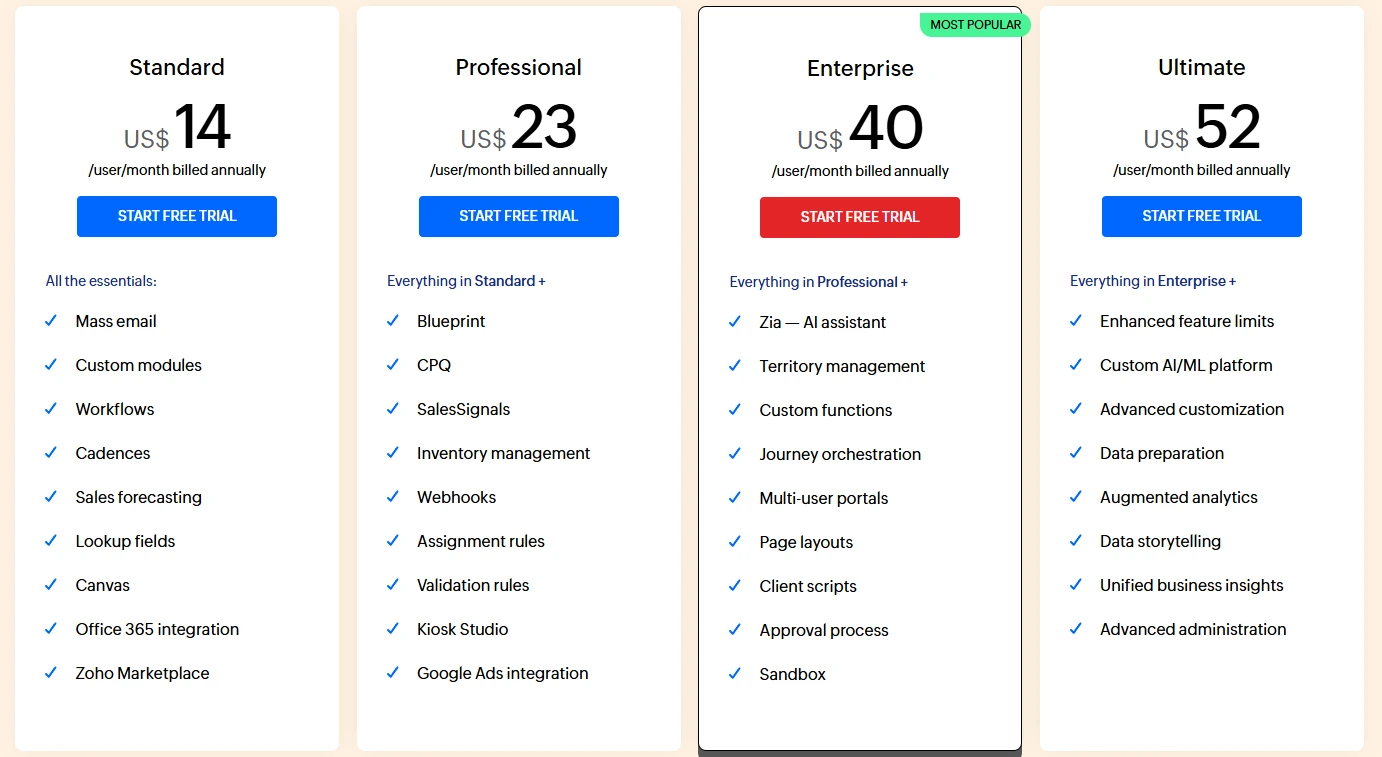
Zoho CRM offers transparent pricing across five main tiers:
- Free Edition: Up to 3 users with essential features including lead management, basic automation, and 1GB storage
- Standard: $14/user/month (annually) with sales forecasting, workflow automations, and custom dashboards
- Professional: $23/user/month (annually) featuring Blueprint, inventory management, and enhanced customization
- Enterprise: $40/user/month (annually) including advanced analytics, territory management, and AI capabilities
- Ultimate: $52/user/month (annually) with advanced BI, data storytelling, and premium support
Pricing verified November 2025, subject to change.
Our Take on Zoho CRM
Zoho CRM stands out for its extensive customization capabilities and transparent pricing structure, particularly when businesses need tailored workflow automations and comprehensive contact management without expensive marketing overhead. From a CRM implementation perspective, we've found that organizations can achieve significant productivity gains through Blueprint's process standardization, though the extensive feature set requires dedicated implementation time to realize full potential. However, the platform's strength in sales-focused functionality may limit companies seeking integrated marketing automation or unified customer experience platforms. For growing companies looking to establish sophisticated sales processes while maintaining cost-effectiveness, this CRM platform often delivers better long-term value than feature-heavy alternatives that charge premium prices for unused marketing tools.

HubSpot positions itself as a unified platform that combines traditional CRM functionality with integrated communication tools. The platform emphasizes multichannel communication while maintaining competitive pricing for growing businesses. What sets HubSpot apart is its comprehensive approach to sales tools, offering everything from web forms for lead capture to advanced reporting and analytics in a single solution.
Key Features
Smart CRM Foundation: HubSpot's core CRM platform provides centralized contact management with unlimited contacts and companies, serving as the foundation for all sales and marketing activities with real-time data synchronization.
Sales Hub Automation: Native email templates, sequence automation, and meeting scheduling tools that eliminate manual outreach tasks while maintaining personalized customer interactions throughout the sales cycle.
Marketing Hub Integration: Built-in email marketing, lead generation forms, and content management that seamlessly connects marketing qualified leads directly into sales pipelines without data transfer complications.
Advanced Deal Management: Visual pipeline management with predictive sales insights, deal forecasting, and automated task creation that helps teams track opportunities and identify potential bottlenecks.
AI Assistant Capabilities: HubSpot's AI-powered tools include conversation intelligence, lead scoring automation, and content optimization suggestions that enhance productivity across sales activities.
Reporting and Analytics: Comprehensive dashboards with attribution tracking, customer journey mapping, and custom reports that provide actionable insights into sales performance and marketing ROI.
Pricing Structure

HubSpot offers flexible pricing across multiple hubs:
Smart CRM:
- Free: Up to 2 users with basic CRM, forms, and email marketing (2,000 emails/month)
- Starter: $15/user/month with advanced features and increased limits
Sales Hub:
- Starter: $9/user/month with email sequences and meeting scheduling
- Professional: $90/user/month with sales automation and reporting
- Enterprise: $150/user/month with advanced analytics and custom objects
Customer Platform (All Hubs):
- Starter: $9/user/month bundling all core features
- Professional: Starting at $800/month with advanced capabilities
- Enterprise: Starting at $3,600/month with full functionality
Pricing verified November 2025. Professional and Enterprise tiers require annual commitments and onboarding fees.
Our Take on HubSpot
HubSpot excels at providing comprehensive communication tools within a unified CRM platform, particularly when businesses need built-in marketing automation, email integration, and seamless lead management workflows. From a CRM implementation perspective, the platform offers exceptional value for organizations wanting to consolidate multiple sales and marketing tools while maintaining straightforward user adoption. However, pricing can escalate significantly as you add users and advanced features, making it potentially more expensive than specialized alternatives for larger organizations. For growing companies looking to unify their sales and marketing operations while maintaining cost-effectiveness, this platform provides comprehensive functionality that often delivers faster time-to-value than implementing multiple separate tools.
Pipeline Management
Both platforms excel at visual sales pipeline management, but their approaches differ significantly. Zoho CRM's pipeline customization allows unlimited custom stages with sophisticated automation rules, making it ideal for complex B2B sales processes that require detailed deal progression tracking. The Blueprint feature provides step-by-step guidance that ensures consistency across sales team activities, particularly valuable for organizations with detailed sales methodologies.
HubSpot's pipeline management emphasizes simplicity and visual appeal, with drag-and-drop functionality that accelerates user adoption. The platform includes predictive deal insights and automated task creation based on deal stage movement. HubSpot's approach works particularly well for teams prioritizing quick implementation over extensive customization options.
Winner: Zoho CRM - The Blueprint workflow builder and unlimited pipeline customization provide superior flexibility for complex sales processes.
Sales Automation and Email Follow-up
Zoho CRM provides extensive workflow automations with custom triggers, field updates, and multi-step sequences that can automate complex business logic. The platform's email automation includes personalized email templates, drip sequences, and advanced scheduling options. Sales teams can create sophisticated nurturing campaigns without requiring separate marketing automation tools.
HubSpot's sales automation focuses on user-friendly sequences and templates with built-in email tracking and reply detection. The platform excels at creating simple, effective follow-up sequences that sales teams can implement immediately. Email integration with Gmail and Outlook provides seamless workflow integration for most sales professionals.
Winner: HubSpot - The intuitive sequence builder and native email integration deliver better user adoption and immediate productivity gains.
Communication Tools
Zoho CRM includes built-in calling and text messaging capabilities through its telephony integration, plus comprehensive email management with spam filtering and template customization. The platform supports multichannel communication tracking, ensuring all customer interactions are properly documented within contact management records.
HubSpot provides integrated calling, email tracking, and meeting scheduling tools with superior user interface design. The conversation intelligence features automatically log call details and identify key conversation topics. HubSpot's communication tools feel more polished and require less configuration than Zoho's alternatives.
Winner: HubSpot - The streamlined communication interface and automatic logging capabilities provide better user experience for sales activities.
Lead Generation and Web Forms
Zoho CRM offers customizable web forms with conditional logic, lead scoring capabilities, and automated assignment rules that can distribute leads based on complex criteria. The platform includes landing page creation tools and social media integration for comprehensive lead capture strategies.
HubSpot's lead generation tools include advanced form builders, pop-up forms, and live chat functionality with chatbot automation. The platform excels at converting website visitors through optimized forms and provides detailed visitor tracking that shows which marketing efforts generate the highest-quality leads.
Winner: HubSpot - The comprehensive lead generation toolkit and visitor tracking provide superior marketing and sales alignment.
Customization and Integration Options
Zoho CRM provides extensive customization through custom modules, fields, and page layouts with a comprehensive API for custom integrations. The platform supports complex business logic through custom functions and offers deep integration with Zoho's business suite. Advanced users can create highly specialized solutions using Zoho Creator and other development tools.
HubSpot offers good customization options including custom properties, deal stages, and workflow automation, though not as extensive as Zoho's capabilities. The platform's 1,900+ app marketplace provides pre-built integrations that reduce implementation complexity. HubSpot prioritizes ease of use over unlimited customization.
Winner: Zoho CRM - The platform provides significantly more customization depth for organizations with unique business requirements.
User Interface and Learning Curve
Zoho CRM's interface provides comprehensive functionality but can feel overwhelming for new users due to the extensive feature set and customization options. The platform requires more training time but offers greater long-term flexibility once teams become proficient with advanced features.
HubSpot prioritizes user experience design with an intuitive interface that minimizes training requirements. New users can typically achieve productivity within days rather than weeks. The platform's design philosophy emphasizes simplicity without sacrificing essential functionality.
Winner: HubSpot - The intuitive design and reduced learning curve provide faster user adoption and team productivity.
Reporting and Analytics
Zoho CRM includes powerful custom report builders with advanced analytics, data visualization tools, and the ability to create complex dashboards that match specific business intelligence requirements. The platform supports advanced data analysis through integration with Zoho Analytics for comprehensive business reporting.
HubSpot provides excellent out-of-the-box reporting with attribution tracking, sales performance dashboards, and marketing ROI analysis. The reports are visually appealing and provide actionable insights without requiring extensive configuration. Advanced analytics features are available in higher-tier plans.
Winner: HubSpot - The comprehensive reporting capabilities and visual design provide better insights for most sales teams.
Customer Service and Ticketing
Zoho CRM includes basic customer service features with case management, though full customer service functionality requires Zoho Desk integration. The platform provides adequate support ticket tracking for sales teams but lacks advanced customer service automation.
HubSpot includes integrated customer service tools with ticket management, knowledge base creation, and customer feedback collection. Service Hub provides comprehensive support functionality that connects seamlessly with sales and marketing data for complete customer journey visibility.
Winner: HubSpot - The integrated customer service capabilities provide better overall customer experience management.

Here's how Zoho CRM performs on major review platforms (as of November 2025):
Zoho CRM:
- G2: 4.2/5 based on 1,600+ reviews
- Capterra: 4.3/5 based on 6,500+ reviews
- TrustRadius: 8.4/10 based on verified reviews
User feedback consistently highlights Zoho CRM's customization capabilities and competitive pricing. One G2 reviewer noted: "The customization options are incredible for tailoring to our specific business process." However, some users report concerns about the learning curve and customer support responsiveness. A Capterra reviewer mentioned: "Powerful features but requires significant time investment to configure properly."
Users particularly appreciate the platform's comprehensive feature set at competitive pricing, though some note that advanced customization requires technical expertise to implement effectively.
Ratings pulled from G2, Capterra, TrustRadius on November 2025. Quotes shortened for clarity.

HubSpot:
- G2: 4.4/5 based on 12,000+ reviews
- Capterra: 4.5/5 based on 4,400+ reviews
- TrustRadius: 8.4/10 based on verified reviews
HubSpot receives praise for user experience and comprehensive functionality. A G2 reviewer stated: "The interface is intuitive and our team was productive within days." However, pricing concerns emerge in user reviews: "Excellent functionality but costs escalate quickly as you add features."
Users particularly appreciate the platform's ease of implementation and comprehensive support resources, though higher-tier pricing can become prohibitive for growing teams.
Ratings pulled from G2, Capterra, TrustRadius on November 2025. Quotes shortened for clarity.
Zoho CRM
HubSpot
Process Documentation Importance
Before evaluating any CRM platform change, document your current customer relationship management processes, pain points, and success metrics. Understanding what works and what doesn't helps determine whether you need a new platform or better optimization of your existing system. Successful CRM implementations start with clear process documentation that can guide platform configuration.
User Adoption Planning with Customer Experience Focus
The best customer relationship management platform is the one your team actually uses consistently. Focus on user experience, training requirements, and change management rather than just feature comparisons when making platform decisions. Consider how the onboarding process will impact daily sales activities and plan accordingly.
Total Cost of Ownership Considerations
Evaluate implementation costs, ongoing training, data migration, integration requirements, and potential productivity loss during transitions. Both Zoho CRM and HubSpot offer compelling value propositions, but the true cost includes configuration time, user training, and ongoing optimization efforts beyond subscription pricing.
Scalability Design Principles
Choose a platform that can grow with your business requirements rather than just meeting current needs. Consider how sales team expansion, additional workflow automations, and integration requirements might evolve. Both platforms offer scalability, but their approaches differ significantly in cost structure and complexity.
Whether you're optimizing your current system or evaluating alternatives, the decision deserves expert guidance that considers your complete business picture. Both Zoho CRM and HubSpot offer compelling advantages depending on your specific requirements, team size, and growth trajectory.
The wrong choice costs more than money - it impacts team productivity, customer relationships, and business growth for years. Rather than guessing based on feature comparisons alone, professional evaluation ensures you avoid costly mistakes that come from reactive decisions.
Every situation is different. Your business model, team dynamics, current processes, and growth trajectory all influence what approach will deliver the best results. We've seen companies transform their sales effectiveness by optimizing existing systems, and guided others through successful transitions to platforms better aligned with their strategic goals.
From our experience, the most successful CRM implementations share common characteristics: clear process documentation, realistic user adoption planning, and strategic alignment between platform capabilities and business objectives. Whether you need better configuration or a strategic platform change, expert guidance helps ensure your investment delivers measurable business results.
The right CRM strategy can accelerate your growth. The wrong one can set you back for years. Rather than making this critical decision in isolation, partner with implementation experts who understand both the technical requirements and business implications of your choice.
Contact Capital S Consulting for strategic guidance that ensures your CRM investment drives real business results, not just feature adoptio



